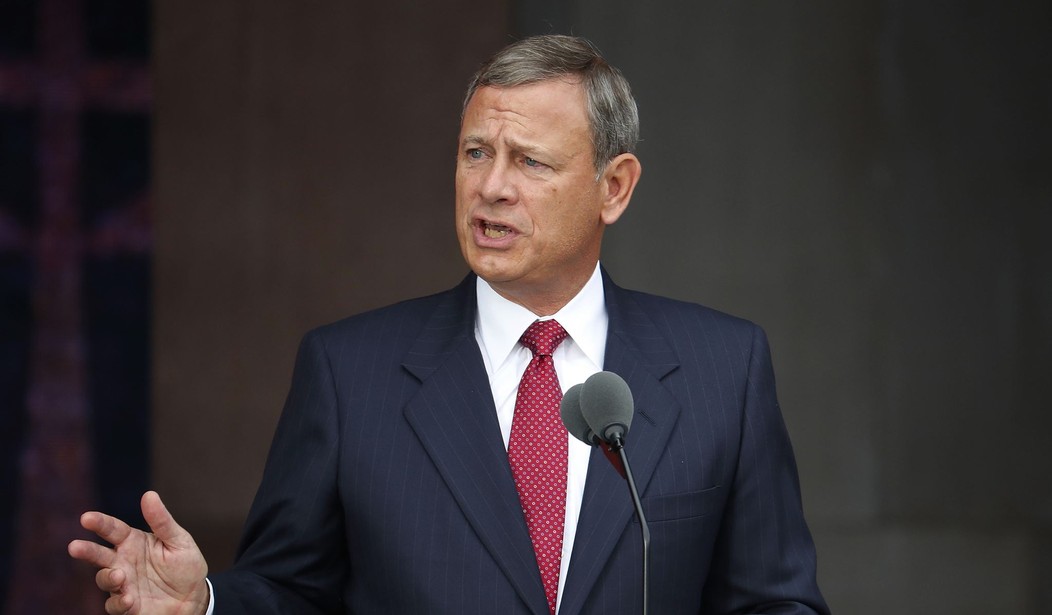“The presiding officer declines to read the question as submitted.”
With those ten words, Chief Justice John Roberts, presiding over the Trump impeachment trial, confirmed his belief that the Whistleblower who has dragged us down this impeachment rathole is indeed the name that has been widely floated. He did so because Sen. Rand Paul’s question did not identify or even suggest that this person is the Whistleblower.
Paul’s question sought an answer from Adam Schiff and the Trump attorneys: Were you aware of a relationship between a partisan NSC staffer and a House Intelligence Committee staffer?
But because Roberts saw the actual name, he censored Paul’s question to protect the Whistleblower’s identity. What sweet irony; in muzzling Paul, Roberts deepened suspicions about this NSC staffer with broad Democrat connections - allegedly the leaker who has landed us in this absurd impeachment exercise.
As Thursday’s final day of senators’ question time dragged on, the Roberts rebuke of Paul lends clarity to two pressing matters. Whether the suspected Whistleblower is actually the guy or not, this imagined right to anonymity is wholly without basis; and Chief Justice Roberts has again given us a reason to doubt his situational courage.
First to the Whistleblower, a term I use only for convenience, since there is really no such person in this entire escapade. The Whistleblower statute does not apply to anyone crying foul about a presidential policy, and even when applied properly, the law exists to protect against reprisals, not to guarantee anonymity.
The hand-wringing and faux outrage over identifying this person have been designed to do only one thing: protect him from the scrutiny that would usually follow charges as impactful as the assertions that sparked the entire impeachment fiasco.
Recommended
So to be clear: If the door is opened to witnesses, there is not one word of law that stands in the way of subpoenaing the Whistleblower so that we might discern his motives and his credibility.
Unfortunately, we must also at this hour question the motives of the Chief Justice of the United States in shutting down a valid question from a Senate juror.
I’m sure Roberts’ mouth went dry as he was handed the Rand Paul question card. The last thing he wanted was to go down in history as the first lofty government figure to speak the suspected name of the Whistleblower. But with no legal, constitutional or parliamentary basis for shutting Paul down, that is precisely what he should have done.
Roberts wears a singular blemish of punting when a choice gets hard. In 2012, when logic and law required him to identify Obamacare’s noxious individual mandates as unconstitutional under the Commerce Clause, he concocted an alternate-universe definition of those mandates as just another layer of the tax code.
He has not publicly shared the rationale for this stretch, but a number of sources who know him well painted a picture of a jurist who did not want to etch his Supreme Court into the tablets of history as having tipped the scale in favor of one side of a pitched political battle. Perhaps it is this desire to avoid decisiveness in hot political battles that led him to silence a senator’s valid question.
But here’s the problem: While it is wise to protect justice from the fierce fires of politics, that instinct should never suppress a proper legal decision, just because it has a political impact.
Roberts was wrong to fudge on Obamacare, and wrong to deny Rand Paul his question in the impeachment trial. It is his job to render decisions that are true to the facts and the law, no matter where the chips fall. That is the courage required of the robe.
At this writing, the whole witness gambit may be crumbling, making Roberts’ shutdown of Paul irrelevant. But as an increasingly constitutionalist court works its way through vital cases in the year ahead, the question arises as to how many tough moments Roberts may sidestep. Many crucial Supreme Court cases have attracted sharp political divides; will he dodge future key decisions for fear of handing a win to one side or the other?
If he blanched at the notion of calling Obamacare what it is, I have serious doubts as to his ability to rightly identify Roe v. Wade as unconstitutional, a decision sorely needed for almost 50 years—not to hand a victory to pro-lifers, but to reach constitutional clarity. Abortion is nowhere to be found in the Constitution, and the founders brilliantly left such matters to the states. Roberts had a grasp on this concept in opposing the federalization of gay marriage in 2015; maybe he would display the same wisdom when Roe is before him. But when huge issues like Obamacare and small moments like Rand Paul’s question card throw him into a fog, the basis for confidence is thin.
So as Friday unfolds, it’s time to bring the curtain down on a number of dramas. Enough contrived angst over a phony Whistleblower. Enough misidentification of what that statute even says and does. Enough attempts to drag impeachment through the month of February. Enough senator questions, enough arguments from both sides, enough hijacking of Senate time and attention.
It is time to wrap this up. Bring on the vote. Let the certainty of Trump’s acquittal settle into history, freeing Americans on all sides to pursue things that really matter.
























Join the conversation as a VIP Member